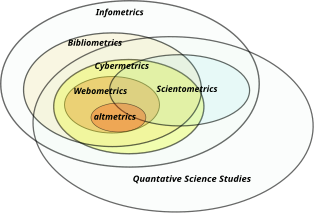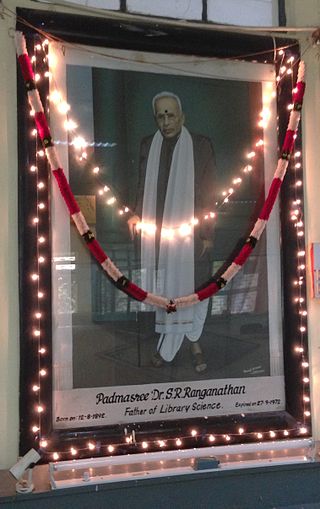Related Research Articles
The Bliss bibliographic classification (BC) is a library classification system that was created by Henry E. Bliss (1870–1955) and published in four volumes between 1940 and 1953. Although originally devised in the United States, it was more commonly adopted by British libraries. A second edition of the system (BC2) has been in ongoing development in Britain since 1977.

Information science is an academic field which is primarily concerned with analysis, collection, classification, manipulation, storage, retrieval, movement, dissemination, and protection of information. Practitioners within and outside the field study the application and the usage of knowledge in organizations in addition to the interaction between people, organizations, and any existing information systems with the aim of creating, replacing, improving, or understanding the information systems.

Shiyali Ramamrita Ranganathan was a librarian and mathematician from India. His most notable contributions to the field were his five laws of library science and the development of the first major faceted classification system, the colon classification. He is considered to be the father of library science, documentation, and information science in India and is widely known throughout the rest of the world for his fundamental thinking in the field. His birthday is observed every year as the National Librarian Day in India.
Relevance is the concept of one topic being connected to another topic in a way that makes it useful to consider the second topic when considering the first. The concept of relevance is studied in many different fields, including cognitive sciences, logic, and library and information science. Most fundamentally, however, it is studied in epistemology. Different theories of knowledge have different implications for what is considered relevant and these fundamental views have implications for all other fields as well.

Browsing is a kind of orienting strategy. It is supposed to identify something of relevance for the browsing organism. In context of humans, it is a metaphor taken from the animal kingdom. It is used, for example, about people browsing open shelves in libraries, window shopping, or browsing databases or the Internet.

The following outline is provided as an overview of and topical guide to library and information science:
Subject indexing is the act of describing or classifying a document by index terms, keywords, or other symbols in order to indicate what different documents are about, to summarize their contents or to increase findability. In other words, it is about identifying and describing the subject of documents. Indexes are constructed, separately, on three distinct levels: terms in a document such as a book; objects in a collection such as a library; and documents within a field of knowledge.
The UNISIST model of information dissemination was proposed in 1971 by the United Nations. UNISIST is a model of the social system of communication, which consists of knowledge producers, intermediaries, and users. These groups of people are different kinds of professionals. The social system also contains institutes such as research institutes, publishers, and libraries. The actors and institutions perform information services such as writing, publishing, storing and retrieving documents and information. The actors are communicating in both formal and informal ways and they are producing different kinds of documents such as journal articles, books, book reviews, proceedings, bibliographies and catalogues, dictionaries, handbooks, encyclopedias and review articles.
Aboutness is a term used in library and information science (LIS), linguistics, philosophy of language, and philosophy of mind. In LIS, it is often considered synonymous with subject (documents). In the philosophy of mind it has been often considered synonymous with intentionality, perhaps since John Searle (1983). In the philosophy of logic and language it is understood as the way a piece of text relates to a subject matter or topic. In general, the term refers to the concept that a text, utterance, image, or action is on or of something.

Library and information science(s) or studies (LIS) is an interdisciplinary field of study that deals generally with organization, access, collection, and regulation of information, whether in physical or digital forms.

The Danish Center for Research on Women and Gender (KVINFO) is a Danish information center about women's issues. It primarily aims to provide the general public with information about the results of women's studies and gender research undertaken in Denmark and internationally.
The following outline is provided as an overview of and topical guide to information science:
In library and information science documents are classified and searched by subject – as well as by other attributes such as author, genre and document type. This makes "subject" a fundamental term in this field. Library and information specialists assign subject labels to documents to make them findable. There are many ways to do this and in general there is not always consensus about which subject should be assigned to a given document. To optimize subject indexing and searching, we need to have a deeper understanding of what a subject is. The question: "what is to be understood by the statement 'document A belongs to subject category X'?" has been debated in the field for more than 100 years

Knowledge Organization: International Journal devoted to Concept Theory, Classification, Indexing, and Knowledge Representation is a peer-reviewed academic journal covering knowledge organization, including concept theory, classification, indexing, and knowledge representation. It is published by Ergon Verlag on behalf of the International Society for Knowledge Organization and was published under the title International Classification between 1974 and 1993. It was established in 1974 with Ingetraut Dahlberg as founding editor-in-chief.

Information history may refer to the history of each of the categories listed below. It should be recognized that the understanding of, for example, libraries as information systems only goes back to about 1950. The application of the term information for earlier systems or societies is a retronym.
The Classification Research Group (CRG) was a significant contributor to classification research and theory in the field of library and information science in the latter half of the 20th century. It was formed in England in 1952 and was active until 1968. Informal meetings continued until 1990. Among its members were Derek Austin, Eric Coates, Jason Farradane, Robert Fairthorne, Douglas Foskett, Barbara Kyle, Derek Langridge, Jack Mills, Pauline Atherton Cochrane, Bernard Palmer, Jack Wells, and Brian Campbell Vickery. The group formed important principles on faceted classification and also worked on the theory of integrative levels.
Evidence-based library and information practice (EBLIP) or evidence-based librarianship (EBL) is the use of evidence-based practices (EBP) in the field of library and information science (LIS). This means that all practical decisions made within LIS should 1) be based on research studies and 2) that these research studies are selected and interpreted according to some specific norms characteristic for EBP. Typically such norms disregard theoretical studies and qualitative studies and consider quantitative studies according to a narrow set of criteria of what counts as evidence. If such a narrow set of methodological criteria are not applied, it is better instead to speak of research based library and information practice.
Birger Hjørland is a professor of knowledge organization at the Royal School of Library and Information Science (RSLIS) in Copenhagen. His main areas of study pertain to theory of library and information science and of knowledge organization. Hjørland has contributed important developments to domain analysis and concept theory. He has been cited as an anchor of North American knowledge organization studies, as well as an information science pioneer.

Ingetraut Dahlberg was a German information scientist and philosopher who developed the universal Information Coding Classification covering some 6,500 subject fields. Her career spanned various roles in research, teaching, editing, and publishing. Dahlberg founded the journal International Classification as well as both the scientific Society for Classification and International Society for Knowledge Organization.
The Information Coding Classification (ICC) is a classification system covering almost all extant 6500 knowledge fields. Its conceptualization goes beyond the scope of the well known library classification systems, such as Dewey Decimal Classification (DDC), Universal Decimal Classification (UDC), and Library of Congress Classification (LCC), by extending also to knowledge systems that so far have not afforded to classify literature. ICC actually presents a flexible universal ordering system for both literature and other kinds of information, set out as knowledge fields. From a methodological point of view, ICC differs from the above-mentioned systems along the following three lines:
- Its main classes are not based on disciplines but on nine live stages of development, so-called ontical levels.
- It breaks them roughly down into hierarchical steps by further nine categories which makes decimal number coding possible.
- The contents of a knowledge field is earmarked via a digital position scheme, which makes the first hierarchical step refer to the nine ontical levels, and the second hierarchical step refer to nine functionally ordered form categories.
References
- ↑ Hjorland, Birger. "ISKO Encyclopedia of Knowledge Organization". www.isko.org. Retrieved 2021-07-12.